| Srl | Item |
| 1 |
ID:
074902
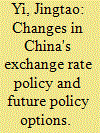

|
|
|
|
|
| Publication |
2006.
|
| Summary/Abstract |
In responding to US pressure for changes in China's exchange rate regime, Chinese Premier Wen Jiabao has repeatedly said that the reform of the RMB exchange rate was a matter of China's sovereignty and that any external pressure or politicisation of an economic matter would not be conducive to a solution of the issue.
|
|
|
|
|
|
|
|
|
|
|
|
|
|
|
|
| 2 |
ID:
132508
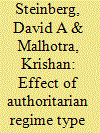

|
|
|
|
|
| Publication |
2014.
|
| Summary/Abstract |
Conventional wisdom holds that autocracies are more likely than democracies to adopt interventionist and protectionist economic policies, including fixed and undervalued exchange rates. This article suggests that this view is only partially correct: nondemocracies are a heterogeneous grouping, and only some types of authoritarian regimes adopt different foreign economic policies from those of their democratic counterparts. Using the example of exchange rate policy, the authors show that foreign economic policy varies across monarchic, military, and civilian dictatorships. More specifically, they hypothesize that monarchies and military regimes are more likely than democracies and civilian dictatorships to maintain fixed exchange rate regimes because the former regimes have smaller "selectorates" than the latter. The authors also expect that monarchies and civilian dictatorships maintain more undervalued exchange rates than democracies and military regimes because the former regimes provide their leaders with greater tenure security than the latter regimes. These hypotheses are evaluated using a time-series-cross-sectional data set of a large sample of developing countries from 1973 to 2006. The statistical results accord with these predictions. These findings indicate that the ways in which democracies engage with the global economy may be less unique than many believe.
|
|
|
|
|
|
|
|
|
|
|
|
|
|
|
|
| 3 |
ID:
095026
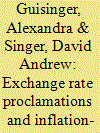

|
|
|
|
|
| Publication |
2010.
|
| Summary/Abstract |
If governments choose economic policies that often run counter to their public commitments, are those commitments meaningless? We argue that government proclamations can be critical in signaling economic policy intentions. We focus on the realm of exchange rate policy, in which countries frequently implement an exchange rate regime that differs from the officially declared regime. We argue that the official exchange rate regime is one of the most important signals of a government's economic policy preferences. When a government makes a de jure public commitment to a fixed exchange rate, it sends a signal to domestic and international markets of its strict monetary-policy priorities. In contrast, a government that proclaims a floating exchange rate signals a desire to retain discretion over monetary policy, even if it has implemented a de facto fixed rate. We use data on 110 developed and developing countries from 1974 to 2004 to test two hypotheses: first, that governments that adopt de facto fixed exchange rates will experience less inflation when they back up their actions with official declarations; and second, that governments that abide by their commitments-as demonstrated by a history of following through on their public declarations of a fixed exchange rate regime-will establish greater inflation-fighting credibility. Within developing countries, democratic institutions enhance this credibility. Results from fixed-effects econometric models provide strong support for our hypotheses.
|
|
|
|
|
|
|
|
|
|
|
|
|
|
|
|
| 4 |
ID:
152507
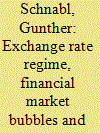

|
|
|
|
|
| Summary/Abstract |
Since 2014, capital inflows into China have turned into capital outflows, reversing the gradual appreciation path of the renminbi against the US dollar into an erratic depreciation path. The paper explains the current capital outflows by comparing China and Japan with respect to the impact of exchange rate expectations on speculative capital flows. It is argued that both in China and Japan, given benign liquidity conditions in the USA, policy-induced appreciation expectations have generated capital inflows that have contributed to overinvestment and financial market bubbles. The current reversal of capital flows is seen as a signal that the bubble in China has burst. To stabilize growth in China and to discourage speculative capital outflows a fixed exchange rate to the dollar is recommended. Given Japan's experience and given that China's foreign assets remain high, the depreciation pressure on the Chinese renminbi can be expected to abate.
|
|
|
|
|
|
|
|
|
|
|
|
|
|
|
|
| 5 |
ID:
070856
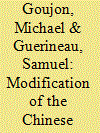

|
|
|
| 6 |
ID:
058789
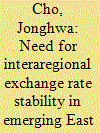

|
|
|
|
|
| Publication |
Fall-Winter 2004.
|
|
|
|
|
|
|
|
|
|
|
|
|
|
|
|
| 7 |
ID:
090806
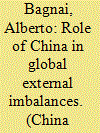

|
|
|
|
|
| Publication |
2009.
|
| Summary/Abstract |
The large imbalances in the current account positions of the US and the Asian economies are seen by most scholars as the main threat to an orderly development of the global economy. While the opinions on the most likely evolution of these imbalances and on their sustainability do differ across observers, ranging from catastrophic to rather optimistic views, almost all agree that some adjustment will have to take place in the near future, and that this adjustment will involve, among other things, a rebalancing of saving and demand across the globe. As an outcome of this process, China shall increasingly supplement the US in the role of engine of global economic growth.
|
|
|
|
|
|
|
|
|
|
|
|
|
|
|
|
| 8 |
ID:
108877
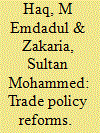

|
|
|
|
|
| Publication |
2011.
|
| Summary/Abstract |
Bangladesh deliberately pursued protectionist economic and trade policy in its early years. However, the country changed the direction shortly after the abrupt political change during mid-seventies and followed the course of reforms in the subsequent years. Although the ice-breaking was quite slow, the reform processes accelerated in the early nineties that resulted many important policy changes. Since then, Bangladesh put its best effort to go with the pace of globalisation and moved rapidly to dismantle the earlier protectionist image of the country. The paper mainly focuses on how Bangladesh persistently adopted the reform measures in the trade policy and gradually approached towards the agendas. It illustrates the changes made to some key trade policy areas, including import and export regimes, exchange rate policy, industrial policy, monetary and fiscal policies, etc.
|
|
|
|
|
|
|
|
|
|
|
|
|
|
|
|
| 9 |
ID:
111760
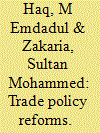

|
|
|